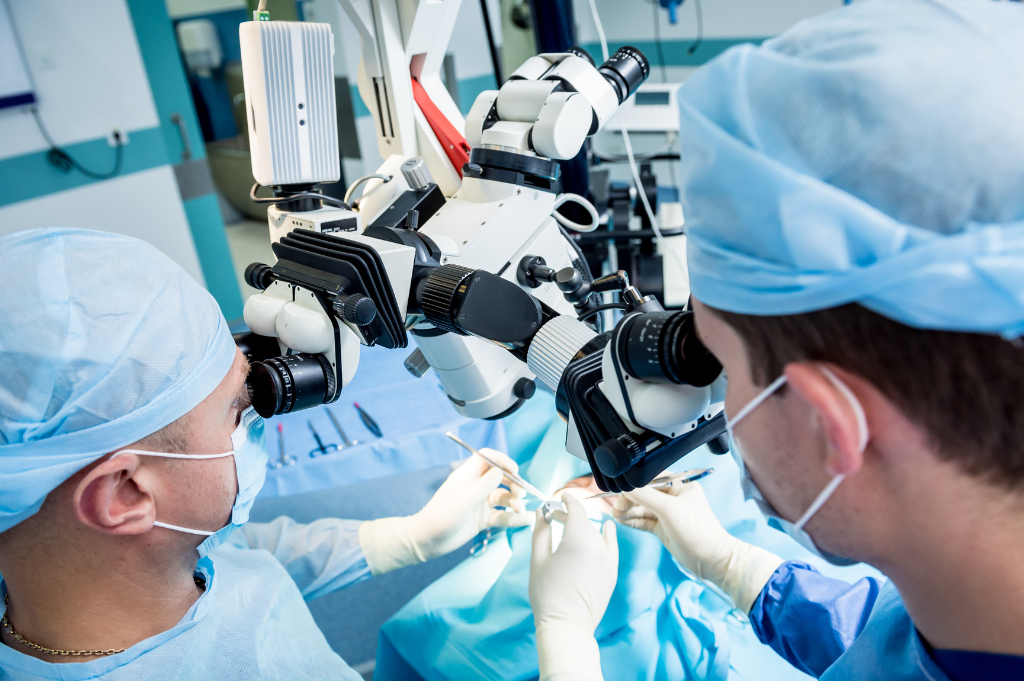
Neurologist vs. Neurosurgeon: Key Differences Explained
Explore career overviews for future medical doctors who plan to focus on brain, spine and nervous system health.
Neurology is a medical area focusing on the brain, spine and nervous system, and two medical specialists are often involved: neurologists and neurosurgeons.
So, what are the differences between the two? Both are highly trained physicians who specialize in treating conditions related to the nervous system, although each specialty may focus on different techniques for treating those conditions.
In this blog, we’ll explore the key difference between a neurologist vs. neurosurgeon and highlight the journey from an MD program to practice.



What Is a Neurologist?
Neurologists specialize in diagnosing, managing and treating disorders of the brain and nervous system.
One of the main differences between a neurologist and a neurosurgeon is that neurologists do not perform surgery. Instead, they study and manage nervous system disorders, treating millions of people worldwide.
Some common conditions they treat include:
- Alzheimer’s and dementia
- Epilepsy and seizures
- Migraines and chronic headaches
- Multiple sclerosis
- Neuropathy and nerve disorders
- Parkinson’s disease
Learn more about different physician specialties in 14 Different Types of Surgeons and Surgical Specialties.
What Is a Neurosurgeon?
Neurosurgeons are medical doctors who specialize in the surgical treatment of disorders affecting the nervous system. They treat the same conditions as neurologists, but step in when surgical intervention is needed.
Structural problems they address include:
- Aneurysms
- Brain tumors
- Carpal tunnel syndrome
- Herniated discs
- Traumatic brain injuries
Their expertise also extends beyond surgery to include comprehensive patient care before, during and after surgical interventions.
What Does a Neurologist Do?
Neurologists serve as the primary specialists for non-surgical neurological care. Their focus is on identifying the root cause of neurological symptoms, and tasks include:
- Conducting physical and neurological examinations.
- Developing treatment strategies for various conditions.
- Prescribing medications for seizures, migraines or movement disorders.
- Providing long-term management for chronic neurological diseases.
- Ordering and interpreting diagnostic tests.
Diagnostic Tools Used by Neurologists
Neurologists utilize many diagnostic tools to evaluate the nervous system. These include:
- Electroencephalography (EEG) to measure brain activity.
- Electromyography (EMG) to assess muscle and nerve function.
- Lumbar puncture (spinal tap) to analyze spinal fluid.
- MRI, CT scans and PET scans to display brain and spinal cord structures.
- Neuropsychological testing to assess cognitive function.
These tools allow neurologists to make accurate diagnoses and effectively monitor treatment progress over time.
What Do Neurosurgeons Do?
Neurosurgeons evaluate patients to determine whether surgery is the best course of treatment. They then perform intricate procedures on the brain, spine and peripheral nerves as needed, using advanced surgical techniques and technologies.
Beyond surgery, neurosurgeons also provide medical management for their patients and often work closely with neurologists for comprehensive care.
What Kind of Surgeries Do Neurosurgeons Perform?
Neurosurgeons perform a wide range of surgical procedures, such as:
- Cerebrovascular Surgery: Repairs structural issues caused by aneurysms, blood vessel malformations and strokes.
- Deep Brain Stimulation (DBS): Implants electrodes in specific brain regions to treat movement disorders like Parkinson’s disease and essential tremor.
- Endovascular Surgical Neuroradiology: A minimally invasive procedure performed through blood vessels to treat brain and spinal conditions.
- Epilepsy Surgery: Removes or alters brain tissue that causes seizures when medications fail to control epilepsy.
- General Neurosurgery: This includes craniotomies, brain tumor removals and basic spinal operations.
- Neurosurgical Oncology: Focuses on surgically treating brain and spinal tumors.
- Pediatric Neurosurgery: Treats neurological conditions in children, including congenital abnormalities, brain tumors and hydrocephalus.
- Peripheral Nerve Surgery: Treats conditions affecting nerves outside the brain and spinal cord, including carpal tunnel syndrome, nerve injuries and nerve tumors.
- Spine Surgery: Treats the spinal column and spinal cord, including herniated discs, spinal stenosis and spinal deformities.
Interested in Learning More?
Contact our expert admissions team to ask any questions you may have and gain valuable guidance.
Key Differences Between Neurologists vs. Neurosurgeons
| Neurologist | Neurosurgeon | |
| Focus | Diagnosis and medical management through medications, therapies and non-invasive procedures. | Surgical intervention and operative procedures. |
| Procedure | Non-surgical: EEG, EMG, nerve conduction studies, lumbar punctures, etc. | Surgical and non-surgical: Craniotomies, spinal surgeries, tumor removals, etc. |
| Conditions | Migraines, epilepsy, multiple sclerosis, Parkinson’s disease, stroke (medical management), etc. | Brain tumors, traumatic brain injury, spinal disorders, aneurysms, etc. |
| Training | 4-year neurology residency (after medical school). | 7-year neurosurgery residency (after medical school). |
What Do Neurologists and Neurosurgeons Have in Common?
While both professions have different approaches to care, neurologists and neurosurgeons still share fundamental similarities.
- Both require extensive knowledge of neuroanatomy, neurophysiology and neurological diseases.
- Both require extensive medical training and advanced education.
- Both specialties demand strong analytical skills and attention to detail.
- Both work closely with patients who have complex brain and spine conditions.
Training Pathway: How to Become a Neurologist and Neurosurgeon?
Neurologists and surgeons follow similar academic and training paths, focusing on medical studies, residency placements and fellowship opportunities; however, there are key educational pathway differences.
Becoming a Neurologist
- Complete medical school.
- Complete a 4-year residency in neurology.
- Optional to complete fellowship training in subspecialties such as epilepsy or movement disorders.
Becoming a Neurosurgeon
- Complete medical school.
- Complete a 7-year neurosurgery residency.
- Optional fellowship in subspecialties like spine surgery or neuro-oncology.
Neurologist and Neurosurgeon Salary and Job Outlook
Both specialties show strong job growth projections due to the aging population and rise of recognized neurological conditions. They consistently rank among the most in-demand physicians, and rural and underserved areas in particular need neurological specialists.
Neurologist Salary: The average salary for neurologists in the U.S. is $291,400 USD. Compensation varies based on subspecialty, location and experience.
Neurosurgeon Salary: Neurosurgeons are among the highest-paid medical specialists, with an average salary in the U.S. of $721,201 USD annually. Subspecialty training, geographic location and practice setting influence compensation levels.
Neurologist vs Neurosurgeon – Choosing Your Career Path
Choosing between neurology and neurosurgery depends on personal interests, career goals and lifestyle preferences. The choice between the two professions comes down to:
- Interest in surgery vs. medical management
- Work-life balance considerations
- Desired income level
- Focus on technical challenges
- Comfort with long training programs
Both careers offer fantastic opportunities to make a difference, impact patients’ lives and contribute to neurological care.
And no matter which pathway you’re interested in, Saba University School of Medicine can help you get there!
Our 10-semester MD program features early hands-on training, financial support, individualized attention, and rotations in North America. Our graduates then go on to secure residency placements at high rates and practice in the U.S., Canada and internationally!
See what we can help you achieve in this recap of our 2025 commencement event:
Then get started by learning how to apply or contacting us for more information.
FAQs About Neuroscience
No, neurologists do not perform surgery. Their training is in medical management of neurological conditions through medications, therapies and non-invasive procedures.
Neurosurgery is considered one of the most challenging medical specialties due to its competitive residency matching process, lengthy training period, intensity, precision and demanding lifestyle. However, different specialties present unique challenges, and “hardest” depends on individual strengths and preferences.
Neurologists perform various diagnostic tests, including MRI, CT scans, EEG, EMG and lumbar punctures.
During a neurological examination, neurologists may assess cognitive function, reflexes, muscle strength and sensory function. These assessments help identify neurological abnormalities and guide diagnostic decisions.

For Prospective Students
SUSOM is committed to supporting prospective students throughout the admissions process. Please click the following links for detailed information about each topic: